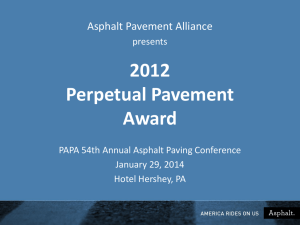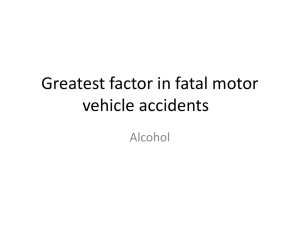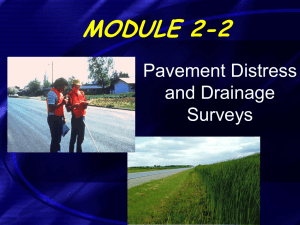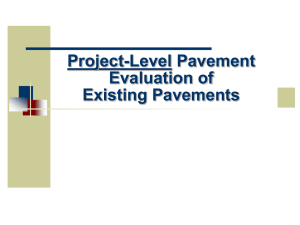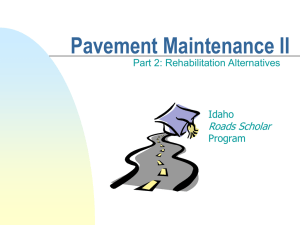MOD5 class 3 Pavemen..
advertisement
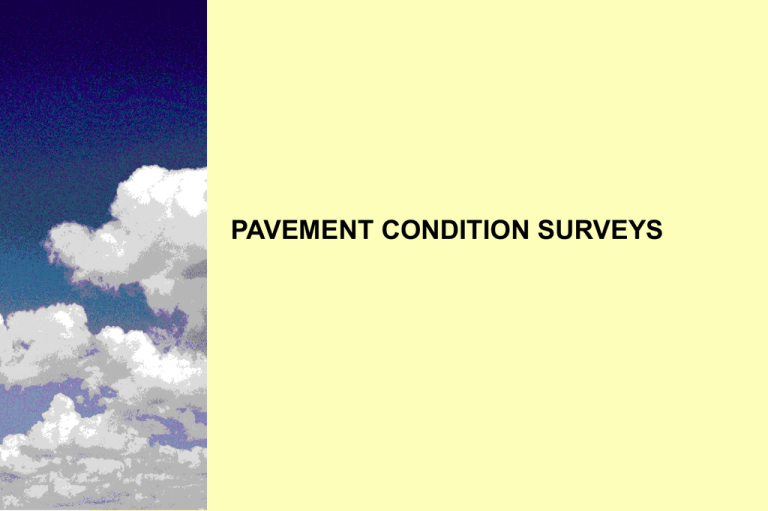
PAVEMENT CONDITION SURVEYS Instructional Objectives Need for condition surveys Collection methodologies Basic types of condition surveys Different procedures and equipment available Condition Surveys are used to assess the “health” of the network. Need for Condition Surveys Evaluate the current condition of the network Determine the rates of deterioration Project future conditions Determine maintenance and rehabilitation needs Determine the costs of repair Prepare plans for repairs Determine the effects of budget reductions and deferred maintenance Schedule future pavement maintenance activities Track performance of various pavement designs and materials Types of Surveys Roughness (Ride Quality) Distress Surveys Rutting Skid Resistance (Surface Friction) Structural Capacity –Project Level Condition Survey Plan Example Survey the outside lane For undivided highways survey one direction For divided highways survey the outside lane in both directions FREQUENCY SAMPLING - RANDOM, PERIODIC, or CONTINUOUS Data Updates REPEAT SCHEDULING - ANNUAL, BIENNIAL Based on Functional Class (e.g., arterials might be inspected annually, collectors every two years, and residential streets every five years) Good pavement distress survey will collect data necessary to: • Identify roads which need no immediate maintenance and therefore, no immediate expenditures • Identify roads which require a minor or routine maintenance and immediate expenditures • Identify roads which require pavement preservation activities such as seal, Micro Surfacing, etc • Identify roads which need minor rehabilitation, major rehabilitation or reconstruction Pavement Condition Survey Equipment Profiler Skid Trailer roughness, distress, rutting, noise, pavement imaging (Safety) Pavement friction GPR Layer Thickness FWD Structural Capacity Manual Survey Pavement Video Systems ROW Pavement Image PROTOCOL DEFINITION A procedure for the objective measurement of a pavement characteristic which defines a minimum standard and a set of parameters regarding the type, precision, quantity, location, reporting, and quality of a measurement to be made PAVEMENT CONDITION EVALUATION ROAD ROUGHNESS "ROAD ROUGHNESS IS THE IRREGULARITIES IN THE PAVEMENT SURFACE AFFECTING USER COMFORT AND SAFETY” DUE TO VARIATIONS IN HORIZONTAL, VERITICAL, AND TRANSVERSE PROFILES RIDE QUALITY - USER PERCEPTION OF PAVEMENT ROUGHNESS IRI ROUGHNESS PROTOCOL IRI is calculated from longitudinal profile measured with a road profiler in both wheelpaths. The average IRI of the two wheelpaths is reported as the roughness of the pavement section. International Roughness Index (IRI) - The IRI is computed from a single longitudinal profile using a quarter-car simulation Little Book of Profiling High Speed Profiler PAVEMENT CONDITION EVALUATION Surface Distress PAVEMENT CONDITION EVALUATION SURFACE DISTRESS Surface distress is damage observed on the pavement surface. DESCRIPTION TYPE OF DISTRESS (Cracking, Patching, Rutting) SEVERITY (Crack Width, Condition Assessment) EXTENT (Length, Area, % of Length or Area) DATA COLLECTION CONTINUOUS - WINDSHIELD SURVEY (COMPUTER RATER KEYBOARD, and VIDEO) PAVEMENT CONDITION EVALUATION SURFACE DISTRESS 1.75 ft 2.5 ft 3.5 ft 2.5 ft 1.75 ft Wheel path Wheel path 12 ft LOAD ASSOCIATED vs. Non-LOAD ASSOCIATED LOCATION Distress Identification Manual for the Long-Term Pavement Performance Program http://www.tfhrc.gov/pavement/ltpp/reports/03031/index.htm NJDOT Version FATIGUE CRACKING CL Inside Wheelpath Center Area Outside Wheelpath Shoulder Level 3 Level 2 MISCELLANEOUS CRACKING CL Inside Wheel Path Center Area Outside Wheel Path Shoulder Miscellaneous Fatigue PAVEMENT CONDITION EVALUATION SURFACE DISTRESS BITUMINOUS and COMPOSITE PAVEMENTS * * * * * * * CRACKING FATIGUE BLOCK EDGE LOGITUDINAL TRANSVERSE REFLECTION PATCH AND PATCH CONDITION POTHOLES SURFACE DEFORMATION RUTTING SHOVING SURFACE DEFECTS BLEEDING WATER BLEEDING AND PUMPING POLISH AGGREGATES RAVELING MISCELLANEOUS SHOULDER CONDITION PAVEMENT CONDITION EVALUATION SURFACE DISTRESS CONCRETE PAVEMENTS * * CRACKING CORNER BREAKS DURABILITY ("D" CRACKING) LOGITUDINAL TRANSVERSE SURFACE DEFECTS MAP CRACKING SCALING POPOUTS POLISH AGGREGATES JOINT DEFECTS JOINT SEAL DAMAGE SPALLING OF LOGITUDINAL/TRANSVERSE JOINTS * * * * * MISCELLANEOUS BLOWUPS FAULTING OF TRANSVERSE JOINTS AND CRACKS LANE-TO-SHOULDER DROPOFF OR SEPARATION LANE-TO-LANE SEPARATION PATCH/PATCH DETERIORATION WATER BLEEDING AND PUMPING PAVEMENT CONDITION EVALUATION SURFACE DISTRESS RATER KEYBOARD Severity * * BC/CO None * * * * Shoulder Condition Severe TRANSVERSE FATIGUE Moderate LOGITUDINAL * Slight Patch Condition Saved at 52.8 foot increments PAVEMENT CONDITION EVALUATION SURFACE DISTRESS RATER FORM Severity * * BC/CO None Slight Moderate LOGITUDINAL TRANSVERSE * * * * * FATIGUE Severe Shoulder Condition Patch Condition Summary for Street Link Distress Data Collection Visual survey Laser technology Film-based systems Video systems Classes of Automated Data Collection Distress images collected on film or high resolution video and: – analyzed while the vehicle collects data – analyzed in the office after data collection – analyzed after data collection by viewing the images Lasers are used to determine changes in surface texture Automated Distress Surveys Increase speed and ease of data collection Reduce transcription errors Increase consistency between classification and quantification Increase safety of field crews Automated Distress Surveys 35 mm analog continuous film technology • Collect pavement images • Analyze images Automated Distress Surveys digital camera technology Automated Distress Surveys • Collect pavement images • Automated Analyze images PAVEMENT CONDITION EVALUATION Rutting PAVEMENT CONDITION EVALUATION Rutting RUT DEPTH MEASUREMENT 3-5 Point Measurement D2 D WPL 1 WPR D3 RD Rut Depth = + D 2 D 3 2 - D 1 Laser Rut Measurement Systems PAVEMENT CONDITION EVALUATION Skid Resistance PAVEMENT CONDITION EVALUATION SKID RESISTANCE SAFETY DESCRIPTION ASSESSMENT OF THE COEFFICIENT OF FRICTION OF THE PAVEMENT SURFACE (BASED ON SPEED) DATA COLLECTION CONTINUOUS - ASTM E274 (LOCK WHEEL) SKID TRAILER slip friction Structural Evaluation Non-Destructive Testing Rolling Weight Deflectometer GPR Ground Penetrating Radar NCHRP Synthesis 255 Ground Penetrating Radar for Evaluating Subsurface Conditions for Transportation Facilities • Asphalt layer thickness determination: GPR results are used to estimate thickness to within 10 percent and thicknesses of up to 0.5 m are accurately measured • Base thickness determination: thicknesses are estimated, provided that there is a dielectric contrast between the base and subgrade The best results occur when subgrade is made up of clay soils which are highly conductive compared to sands or gravels Ground Penetrating Radar NCHRP Synthesis 255 Ground Penetrating Radar for Evaluating Subsurface Conditions for Transportation Facilities • Concrete thickness determination: depth constraints and accuracy are not yet well defined. This is because portland cement concrete attenuates GPR signals more than asphalt, PCC conductivity changes as the cement hydrates, slabs that contain steel make interpretation more difficult • Void detection: GPR has detected air-filled voids as thin as 6 mm, while the detection of water-filled voids is more problematic GPR Basics Antenna Antenna PAVEMENT CONDITION EVALUATION Structural Capacity Project Level PMS Structural Evaluation Destructive Testing Coring Laboratory testing Excavation of pits Field CBR Dutch Cone Penetrometer Structural Evaluation Non-Destructive Testing Benkelman Beam Dynaflect Structural Evaluation Non-Destructive Testing Road Rater FWD PAVEMENT CONDITION EVALUATION STRUCTURAL LOAD CAPACITY Project Level PMS DESCRIPTION ASSESSMENT OF THE LOAD CARRYING CAPACITY OF THE PAVEMENT STRUCTURE DATA COLLECTION DESTRUCTIVE - CORING/BORINGS/LAB TESTS NON-DESTRUCTIVE TEST – FALLING WEIGHT DEFLECTOMETER (FWD) CONCRETE JOINT LOAD TRANSFER EFFICIENCY GROUND PENETRATING RADAR Questions?
